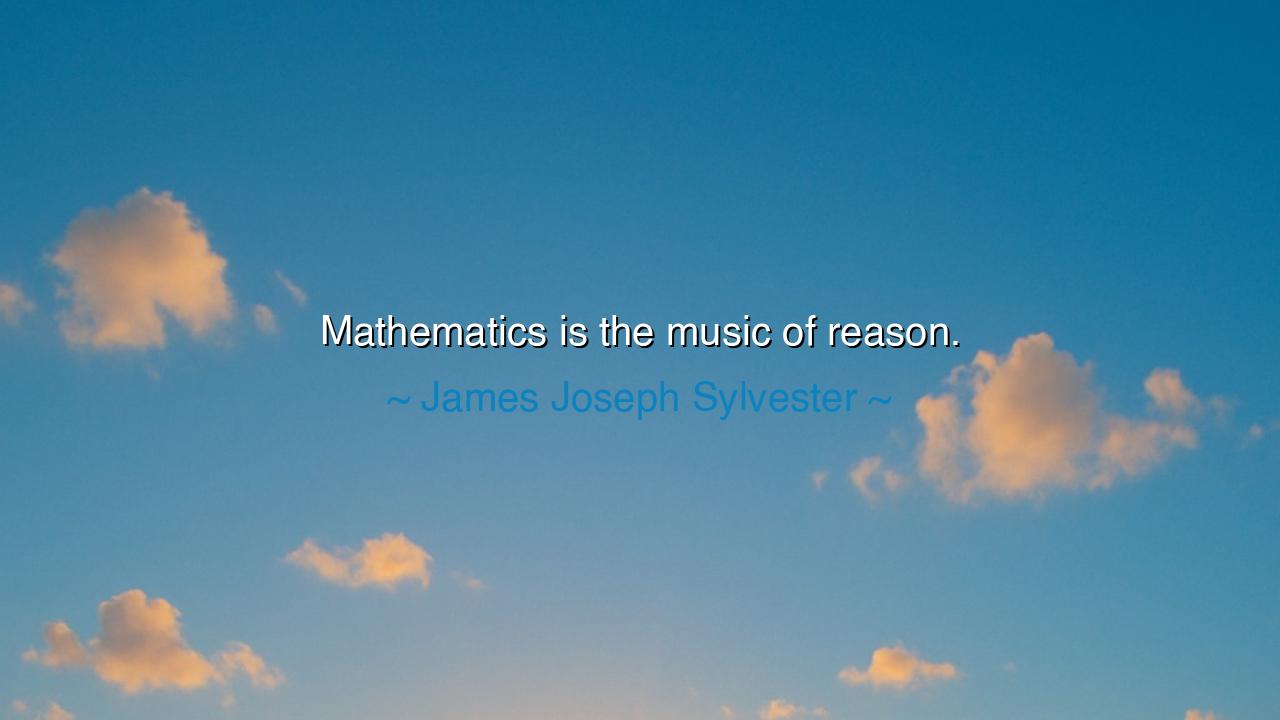
Mathematics is the music of reason.






The mathematician James Joseph Sylvester, with vision as keen as a seer, once proclaimed: “Mathematics is the music of reason.” In this brief yet mighty utterance, he revealed a truth that binds together two realms often thought apart: the rigid clarity of reason and the flowing beauty of music. For what is mathematics if not a grand symphony, composed of patterns, rhythms, and harmonies invisible to the ear, yet resounding within the mind? And what is reason if not the disciplined instrument through which this silent music is played?
The ancients understood this kinship well. The philosopher Pythagoras taught that numbers governed not only trade and measure, but the very harmony of the heavens. He spoke of the “music of the spheres,” a celestial chorus produced by the movements of the stars, each orbit a note, each relation a chord. In Sylvester’s words, we hear an echo of that ancient teaching—that mathematics, far from being cold, is a living art, the hidden melody of the cosmos, revealed only to those who learn to listen with the mind’s ear.
To the casual eye, numbers may appear as mere symbols upon a page, lifeless and fixed. But to those who study them deeply, they sing. The equation has its rhythm, the proof its cadence, the theorem its triumphant crescendo. Consider the elegance of Euclid’s geometry: each proposition builds upon the last like a rising scale, until at last the harmony resolves in clarity. Here, reason does not march like a soldier—it dances, it plays, it soars, much as a symphony moves from theme to theme. Thus, mathematics becomes not only the language of science, but the art of reason, expressed in purest form.
History gives us luminous examples of this truth. Think of Johannes Kepler, who gazed upon the heavens with both the eye of a scientist and the soul of a musician. He discovered that the planets moved not in perfect circles but in ellipses, and within this insight, he heard harmony. To him, the laws of planetary motion were not dry mechanics but the notes of God’s grand composition, binding the universe in majestic order. His discoveries remind us that to do mathematics is to hear, in silence, the eternal music of creation.
Yet Sylvester’s words carry not only wonder, but also guidance. They remind us that reason, when rightly pursued, need not be harsh nor joyless. Too often do we treat logic as cold calculation, when in truth it is alive with beauty. To think clearly, to solve with patience, to see the pattern in chaos—these are not burdens but songs, opportunities to join in the harmony of truth. When one embraces this perspective, even the most difficult problem becomes less a weight to bear and more a puzzle to be played, like notes waiting to resolve into melody.
For us, the lesson is profound: embrace the discipline of reason as one embraces the practice of music. Just as a musician must rehearse scales to reach mastery, so must the seeker of truth train the mind with study and patience. Just as music requires both precision and passion, so does mathematics demand both rigor and imagination. And just as music uplifts the heart, so too can reason, rightly pursued, uplift the spirit by revealing the hidden beauty woven into the fabric of reality.
Practically, this means approaching learning not as drudgery but as art. When you encounter a problem, do not despair, but listen for its hidden rhythm. When you study, let curiosity, not fear, be your guide. See in mathematics not only utility, but wonder; in reason not only rules, but harmony. By doing so, you not only sharpen your mind—you also tune your soul to the great song that underlies all things.
Thus, remember Sylvester’s immortal truth: mathematics is the music of reason. It is the eternal symphony written in the stars, in the atoms, in the beating of your heart. To study it is to join in the chorus of creation, to play upon the instrument of the mind, and to find joy not only in answers, but in the melody of seeking itself.






AAdministratorAdministrator
Welcome, honored guests. Please leave a comment, we will respond soon